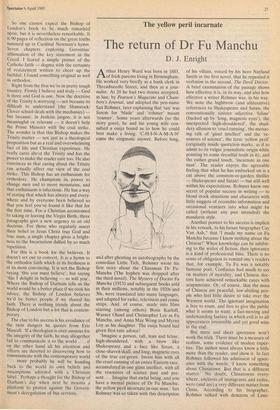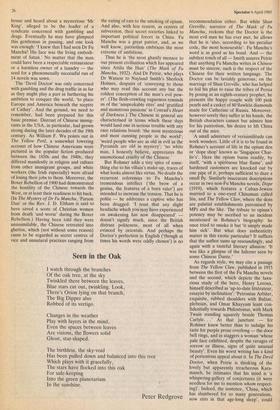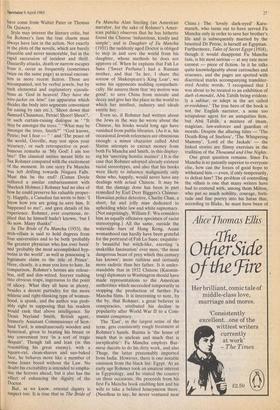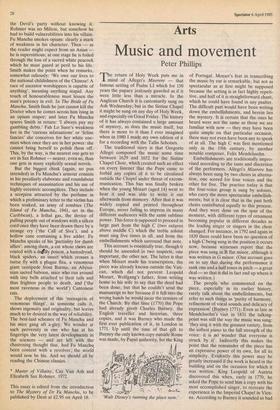The yellow peril incarnate
The return of Dr Fu Manchu
D. J. Enright
Arthur Henry Ward was born in 1883, of Irish parents living in Birmingham. He worked very briefly as a bank clerk in Threadneedle Street, and then as a jour- nalist. At 20 he had two stories accepted, at last, by Pearson's Magazine and Cham- bers's Journal, and adopted the pen-name Sax Rohmer, later explaining that 'sax' was Saxon for 'blade' and `rohmer' meant 'roamer'. Some years afterwards (so the story goes), he and his young wife con- sulted a ouija board as to how he could best make a living. `C-H-I-N-A-M-A-N' came the enigmatic answer. Before long,
and after ghosting an autobiography by the comedian Little Tich, Rohmer wrote his first story about the Chinaman Dr Fu- Manchu (The hyphen was dropped after the third novel). The Mystery of Doctor Fu Manchu (1913) and subsequent books sold in their millions, notably in the 1920s and 30s, were translated into many languages, and adapted for radio, television and comic strips. And, of course, made into films starring (among others) Boris Karloff, Warner Oland and Christopher Lee as Fu Manchu, and Anna May Wong and Myrna Loy as his daughter. The ouija board had given first-rate advice!
'Imagine a person, tall, lean and feline, high-shouldered, with a brow like Shakespeare and a face like Satan, a close-shaven skull, and long, magnetic eyes of the true cat-green. Invest him with all the cruel cunning of an entire Eastern race, accumulated in one giant intellect, with all the resources of science past and pre- sent. . . Imagine that awful being, and you have a mental picture of Dr Fu Manchu, the yellow peril incarnate in one man.' Sax Rohmer was so taken with this description of his villain, voiced by his hero Nayland Smith in the first novel, that he repeated it verbatim in the second, The Devil Doctor. A brief examination of the passage shows how effective it is, in its way, and also how effective a writer Rohmer was, in his way. We note the highbrow (and alliterative) references to Shakespeare and Satan, the conventionally sinister adjective 'feline' (backed up by 'long, magnetic eyes'), the unexpected 'high-shouldered', the shud- dery allusion to 'cruel cunning', the menac- ing talk of 'giant intellect' and the 're- sources of science', the term 'yellow peril' (originally inside quotation marks, as if to admit to its vulgar journalistic origin while pointing to some dreadful truth in it), and the rather grand touch, 'incarnate in one man'. The reader enjoys the agreeable feeling that what he has embarked on is a cut above the common-or-garden thriller — Shakespeare and Satan! — but still well within his expectations. Rohmer knew one secret of popular success in writing — to blend stock situations and characters with little nuggets of recondite information and occasional ventures into what might be called (without any pun intended) the mandarin style.
Another pointer to his success is implicit in his remark, to his future biographer Cay Van Ash,* that 'I made my name on Fu Manchu because I know nothing about the Chinese!' When knowledge can be inhibit- ing to the writer of fiction, then ignorance is a kind of professional bliss. There is no sense of obligation to remind one's readers that, for example, Tu Fu was a notably humane poet, Confucius had much to say on matters of morality, and Chinese doc- tors have achieved remarkable cures with acupuncture. Or, of course, that the mass of Chinese are peaceful, law-abiding peo- ple who feel little desire to take over the Western world. The ignorant imagination is free to roam, and free to give the public what it seems to want: a fast-moving and undemanding fantasy in which evil is to all appearances irresistible and yet good wins in the end.
But mere and sheer ignorance won't work the trick. There must be a measure of realism, some evidence of modest exper- tise. The author must always know a little more than the reader, and show it. In fact Rohmer followed his admission of ignor- ance with the words: 'I know something about Chinatown. But that is a different matter.' No doubt, Chinatowns every- where, enclaves of immigrants and exiles, were (and are) a very different matter from China. According to his biographer, Rohmer talked with denizens of Lime- house and heard about a mysterious 'Mr King', alleged to be the leader of a syndicate concerned with gambling and drugs. Eventually he may have glimpsed this gentleman in passing, and one look was enough: 'I knew that I had seen Dr Fu Manchu! His face was the living embodi- ment of Satan.' No matter that the man could have been a respectable restaurateur or a harmless owner of a laundry — the seed for a phenomenally successful run of 14 novels was sown.
The 'Devil Doctor' was only concerned with gambling and the drug traffic in as far as they might play a part in furthering his ambition to conquer the world, `to place Europe and America beneath the sceptre of Cathay'. And the ground, we need to remember, had been prepared for this basic premise. Distrust of Chinese immig- rants in the USA, in particular, had grown strong during the later decades of the 19th century. As William F. Wu points out in The Yellow Peril, a somewhat lowering account of how Chinese Americans were pictured in the popular fiction produced between the 1850s and the 1940s, they differed manifestly in religion and culture from other immigrant groups, and white workers (the Irish especially) were afraid of losing their jobs to them. Moreover, the Boxer Rebellion of 1900 had demonstrated the hostility of the Chinese towards the West, or at least their readiness to hit back. (In The Mystery of Dr Fu Manchu, 'Parson Dan' or the Rev. J. D. Eltham is said to have saved a score of Christian women from death 'and worse' during the Boxer Rebellion.) Having been told they were unassimilable, the Chinese retreated into ghettos, which (not without some reason) came to be regarded as secret centres of vice and unnatural practices ranging from
the eating of rats to the smoking of opium. And also, with less reason, as centres of subversion, their secret societies linked to important political forces in China. Fu Manchu was a great patriot, and, as we well know, patriotism embraces the most extreme of ambitions.
Thus he is 'the most ghastly menace to our present civilisation which has appeared since Attila the Hun' (The Mask of Fu Manchu, 1932). And Dr Petrie, who plays Dr Watson to Nayland Smith's Sherlock Holmes, despairs of 'conveying to those who may read this account any but the coldest conception of the man's evil pow- er'. (The flesh-crawling vagueness reminds us of the 'unspeakable rites' and 'gratified and monstrous passions' in Conrad's Heart of Darkness.) The Chinese in general are characterised in terms which these days would land one in serious trouble with any race relations board: 'the most mysterious and most cunning people in the world'; `weird people who are as old in evil as the Pyramids are old in mystery'; `no white man, I honestly believe, appreciates the unemotional cruelty of the Chinese.'
But Rohmer adds a tiny spice of some- thing else to his villain's make-up, traces of what looks almost like virtue. No doubt the recurrent references to Fu Manchu's tremendous intellect (`the brow of a genius, the features of a born ruler') are intended to increase the tension. That he is polite — he addresses a captive who has been drugged: 'I trust that any slight headache which you may have experienced on awakening has now disappeared' doesn't signify much, since the British distrust politeness, most of all when evinced by orientals. And perhaps the Doctor's perfection in English (`though at times his words were oddly chosen') is no recommendation either. But while Shan Greville, narrator of The Mask of Fu Manchu, reckons that the Doctor is the
most evil man he has ever met, he allows that he is 'also, according to his peculiar code, the most honourable'. Fu Manchu's word is as good as his bond. And — the subtlest touch of all — Smith assures Petrie
that anything Fu Manchu writes in Chinese
must be sincere, such is the respect of the Chinese for their written language. The Doctor can be lavishly generous; on the marriage of Shan Greville, who has helped to foil his plan to raise the tribes of Persia by posing as an eighth-century prophet, he presents the happy couple with 100 pink pearls and a casket of 80 flawliss diamonds made for Catherine of Russia. Moreover, however sorely they suffer at his hands, the British characters cannot but admire him for his patriotism, his desire to lift China out of the mire.
A small admixture of verisimilitude can work wonders. Little of it is to be found in Rohmer's account of life in the opium den or 'dope shop' known as 'Singapore Char- lie's'. Here the opium burns readily, by itself, 'with a spirituous blue flame', and hardened customers are knocked out by one pipe of it, perhaps sufficient to daze a small fly. Similarly inaccurate descriptions occur in two non-Fu Manchu novels, Dope (1919), which features a Cuban-Jewess married to a one-eyed Chinaman called Sin, and The Yellow Claw, where the dens are palatial establishments patronised by MPs and the like. The tribute to opium's potency may be ascribed to an incident mentioned in Rohmer's biography: he once tried to smoke it but 'it simply made him sick'. But what does authenticity matter in this exotic particular? It suffices that the author sums up resoundingly, and again with a tasteful literary allusion: 'It was like a glimpse of the Inferno seen by some Chinese Dante.'
As regards style, we may cite a passage from The Yellow Claw, published in 1915 between the first of the Fu Manchu novels and the second, which depicts the luxu- rious study of the hero, Henry Leroux, himself described as 'up-to-date litterateur, essayist by inclination': 'Petronius Arbiter, exquisite, rubbed shoulders with Balzac, plebeian, and Omar Khayyam leant con-
fidentially towards Philostratus, with Mark Twain standing squarely beside Thomas
Carlyle. . .' At that juncture — for
Rohmer knew better than to indulge his taste for purple prose overlong — the door bell rings, and in staggers a woman 'whose pale face exhibited, despite the ravages of sorrow or illness, signs of quite unusual
beauty'. Even his worst writing has a kind of portentous appeal about it. In The Devil Doctor, when Petrie is thinking of the lovely but apparently treacherous Kara- maneh, he intimates that his mind is 'a whispering-gallery of conjectures (it were needless for me to mention whom respect- ing)'. Indeed, the sentence, 'China, which has slumbered for so many generations, now stirs in that age-long sleep', could
have come from Walter Pater or Thomas be Quincey.
Style may interest the literary critic, but for Rohmer's fans the true charm must always have lain in the action. Not exactly in the plots of the novels, which are barely plausible and never memorable, but in the rapid succession of incident and thrill. Dastardly attacks, death or narrow escapes from it, occur as frequently (sometimes twice on the same page) as sexual encoun- ters in more recent fiction. These are accompanied, not by verbal jewels, but by such elemental and explanatory ejacula- tions as 'God in heaven! They have the wire jacket on him!' (an apparatus which divides the body into segments convenient for eating by rats etc.), 'Shoot down that damned Chinaman, Petrie! Shoot! Shoot'!, or such curtain-raising dialogue as "It may be amongst the trees." "What may be amongst the trees, Smith?" "God knows, Petrie; but I fear — " ' and The peace of the world, Greville, may rest upon your accuracy,' or such retrospective or post- humous remarks as 'My God! I am too late!' The classical unities meant little to Sax Rohmer compared with the excitement of the moment. In one story Fu Manchu was left drifting towards Niagara Falls. Must this be the end? (Conan Doyle suffered a similar embarrassment with Sherlock Holmes.) Rohmer had no idea of how he could preserve his valuable proper- ty. Happily, a Canadian fan wrote to him: 'I know how you are going to save him. It happened to me!', and gave details of his experience. Rohmer, ever courteous, re- plied that he himself hadn't known, 'but I do now. Many thanks!'
In The Bride of Fu Manchu (1933), the arch-villain is said to hold degrees from four universities and to be both 'probably the greatest physician who has ever been' and 'probably the most accomplished hyp- notist in the world', as well as possessing 'a legitimate claim to the title of Prince'. Here, clearly, is a man you love to hate. In comparison, Rohmer's heroes are colour- less, stiff and dim-witted, forever rushing into obvious traps, ingenuous to the point of idiocy. What they all have in plenty, besides a decent partiality for the more athletic and right-thinking type of woman-
hood, is spunk, and the author was prob- ably right in supposing that his readers Would rank that above intelligence. Sir Denis Nayland Smith, British agent, formerly Assistant Commissioner of Scot- land Yard, is simultaneously wooden and hysterical, given to beating his breast or any convenient tree 'in a sort of tragic despair'. Though tall and lean (in this resembling his great enemy), with a square-cut, clean-shaven and sun-baked face, he behaves more like a member of some lesser breed without the Law. No doubt his excitability is intended to empha- sise the horrors ahead, but it also has the effect of enhancing the dignity of the Doctor.
But, as we know, oriental dignity is suspect too. It is true that in The Bride of Fu Manchu Alan Sterling (an American narrator, for the sake of Rohmer's Amer- ican public) observes that he has hitherto found the Chinese 'industrious, kindly and simple'; and in Daughter of Fu Manchu (1931) the suddenly aged Doctor is obliged to step in and save the world from his daughter, whose methods he does not approve of. When he explains that Fah Lo Suee ('Sweet Perfume') had a Russian mother, and that 'In her, I share the sorrow of Shakespeare's King Lear', we sense his opponents nodding sympatheti- cally. He assures them that 'my motive was good': to save China from misrule and decay and give her the place in the world to which her intellect, industry and ideals entitle her.
Even so, if Rohmer had written about the Jews in the way he wrote about the Chinese, his books would long ago have vanished from public libraries. (As it is, his occasional Jewish references are obnoxious enough: a minor character called Abel Slattin attempts to extract money from both Fu Manchu and Smith, in this display- ing his 'unerring Semitic instinct'.) It is the case that Rohmer adopted already existent racial stereotypes, and also that his books were likely to infuence malignantly only those who, happily, would never have any dealings with actual Chinese. It may be that the damage done has been in part remedied by Earl Derr Biggers's Chinese- Hawaiian police detective, Charlie Chan, a short, fat and jolly man dedicated to upholding white law and white supremacy. (Not surprisingly, William F. Wu considers him an equally offensive specimen of racist stereotyping.) All the same, outside the waterside bars of Hong Kong, Asian womanhood can hardly have been grateful for the portrayal of Fah Lo Suee: exquisite- ly beautiful but witch-like, exerting 'a snakelike fascination' over men, 'the most dangerous beast of prey which this century has known'; more ruthless and certainly more sadistic than her father. It is under- standable that in 1932 Chinese (Kuomin- tang) diplomats in Washington should have made representations to the American authorities which succeeded temporarily in stopping the production of further Fu Manchu films. It is interesting to note, by the by, that Rohmer, a great believer in conspiracies, attributed his decline in popularity after World War II to a Com- munist conspiracy.
The 'East', in the largest sense of the term, gets consistently rough treatment at Rohmer's hands. Burma is 'the home of much that is unclean and much that is inexplicable': Fu Manchu employs Bur- mese dacoits to do his dirty work, and also Thugs, the latter presumably imported from India. However, there is one notable omission from the black list: Egypt. At an early age Rohmer took an amateur interest in Egyptology, and he visited the country on three occasions, the proceeds from his first Fu Manchu book enabling him and his wife to take a belated honeymoon there.. (Needless to say, he never ventured near
China.) The 'lovely dark-eyed' Kara- maneh, who turns out to have served Fu Manchu only in order to save her brother's life and is subsequently married by the besotted Dr Petrie, is herself an Egyptian. Furthermore, Tales of Secret Egypt (1918), though it would disappoint Fu Manchu fans, is his most serious — at any rate most earnest — piece of fiction. In it he talks quite knowledgeably about cartouches and uraeuses, and the pages are spotted with diacritical marks accompanying transliter- ated Arabic words. 'I recognised that I was about to be treated to an exhibition of darb el-mendel, Abu Tabah being evident- ly a sahhar, or adept in the art called er-roolitinee.' The true hero of the book is not the English narrator, a none too scrupulous agent for an antiquities firm, but Abu Tabah, a mixture of imam, magician, law-enforcer and guardian of morals. Despite the alluring titles — 'The Death-Ring of Sneferu', 'The Whispering Mummy', 'Lord of the Jackals' — the linked stories are flimsy exercises in the tradition of the Thousand and One Nights.
One great question remains. Since Fu Manchu is so patently superior to everyone else, how can the forces of good hope to withstand him — even, if only temporarily, to defeat him? The problem of controlling the villain is one that many writers have had to contend with, among them Milton, who put so much nobility, courage, forti- tude and fine poetry into his Satan that, according to Blake, he must have been of the Devil's party without knowing it. Rohmer was no Milton, but somehow he had to build vulnerabilities into his villain. Fu Manchu smokes opium: clearly a mark of weakness in his character. Then — as the reader might expect from an Asian he is superstitious; at one stage he is foiled through the loss of a sacred white peacock which he must guard at peril to his life. Smith makes the point when he remarks, somewhat odiously: 'We owe our lives to the national childishness of the Chinese! A race of ancestor worshippers is capable of anything', meaning anything stupid. Any touch of honourableness must lessen the man's potency in evil. In The Bride of Fu Manchu, Smith finds he just cannot kill the Doctor when he comes across him lying in an opium stupor; and later Fu Manchu spares Smith in return: 'I always pay my gambling debts.' Fah Lo Suee's weakness lies in the 'curious infatuations' or 'feline fancies' she conceives for her white ene- mies when once they are in her power: she cannot bring herself to polish them off. This, by the way, is the nearest one gets to sex in Sax Rohmer — nearer, even so, than one gets in many explicitly sexual novels.
But the biggest chink (again, no pun intended) in Fu Manchu's armour consists in his peculiarly elaborate and roundabout techniques of assassination and his use of highly eccentric accomplices. They include a scorpion attracted by the perfume in which a preliminary letter to the victim has been soaked, an army of zombies (The Island of Fu Manchu, 1941, set in the Caribbean), a lethal gas, the device of pulling people out of windows with a silken cord once they have been.drawn there by a strange cry ('the Call of Siva'), and a hollow cane containing a live adder. Fu Manchu speaks of his 'partiality for dumb allies': among them, g cat whose claws are coated with a defdly poison, a hamadryad, black spiders,- an insect which crosses a tsetse fly with a plague flea, a venomous giant centipede from Burma, an Abyssi-
nian sacred baboon, mice who run around with tiny bells attached to their tails and thus frighten people to death, and ('the most ravenous in the world') Cantonese rats.
The deployment of this 'menagerie of venomous things', as someone calls it, shows ingenuity and originality, but leaves much to be desired in the way of reliability. The best-laid schemes of Fu Manchu and his mice gang aft a-gley. We wonder at such perversity in one who has at his fingertips the very latest developments in
the sciences — and are left with the' chastening thought that, had Fu Manchu, been content with a revolver, the world would now be his. And we should all be reading the Chinese classics.
* Master of Villainy, Cay Van Ash and Elizabeth Sax Rohmer, 1972.
This essay is edited from the introduction to The Mystery of Dr Fu Manchu, to be published by Dent at £2.95 on. April 18.













































 Previous page
Previous page